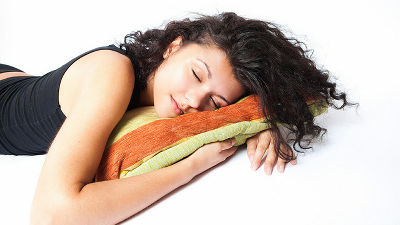What are the eight myths about sleep, such as 'eating cheese has nightmares' and '5 hours of sleep is enough for humans'?

Sleep is one of the essential elements for human life and is closely related to the quality of life, so various theories related to sleep are whispered among people. Science-based media Live Science explains the `` eight myths about sleep '' that sometimes even harm humans.
8 common sleep myths debunked | Live Science
◆ 1: Eating cheese gives you nightmares
It may not be very familiar in Japan, but in Europe and the United States, it is sometimes said that 'eating cheese gives you nightmares.' However, a paper published in 2015 found no evidence to suggest that eating cheese causes nightmares. Disturbing and vivid dreams were not related to what you ate, but to impulsive eating, overeating, and dieting.
On the other hand, a 2019 paper showed that late-night meals and irregular eating habits fluctuate circadian rhythms, disrupting sleep patterns, and eating something before going to bed, whether cheese or not. and may be easier to dream. The American nonprofit Sleep Foundation advises avoiding late-night snacks, cheese or not, because irregular or inadequate sleep can trigger nightmares.
◆ 2: Drinking alcohol can help you sleep better
Guy Meadows, founder of The Sleep School , a platform that provides scientific advice on sleep, tells Live Science that alcohol has a sedative effect that can help you relax and fall asleep faster. On the other hand, 'alcohol reduces REM sleep , which is necessary for memory and emotional processing. If you start to accumulate REM sleep debt, you may have problems with concentration, learning, and long-term memory consolidation.' , claiming that alcohol can adversely affect sleep quality. A 2018 paper also suggested that alcohol increases the risk of snoring and sleep apnea by up to 25%, which can lead to further sleep disturbances.

◆ 3: Everyone needs to sleep 8 hours a day
In general, it is said that '8 hours of sleep per day' is good for health, but how much sleep you actually need varies from person to person. According to the Sleep Foundation
◆ 4: It's okay to sleep for 5 hours a day
Some people say that sleeping for a long time is better for your health, while others claim that ``humans can sleep 5 hours a day.'' Certainly, some people seem to be active even with short sleep hours, but a 2017 paper showed that reduced sleep time is related to obesity, diabetes, heart disease, and high blood pressure. It has been.
Scientists have identified genetic mutations that produce ``short sleepers'' that are okay with short sleep times, but people with these genetic mutations are rare, and most people sleep for 5 hours. He said he wasn't getting enough sleep. ``It's important to note that humans can't change or control how much sleep they need because their biological sleep needs are encoded in their genes,'' Meadows said. is very important for staying healthy,' she told Live Science.

◆ 5: Elderly people need less sleep
In general, it is said that the older the person, the shorter the necessary sleep time, and some people actually wake up early in the morning as they get older. However, in reality, the elderly need the same amount of sleep as young people, and the shorter sleep time is just that the sleep is shallower.
“By your 50s, you may have lost up to 70% of the deep sleep you had in your 20s,” says Meadows. 'Deep sleep decreases and sleep-disrupting diseases and associated medications increase, making it harder to get enough quality sleep.' It seems that frequent urination and arthritis due to weakening of the bladder (bladder) are cited as factors that hinder the sleep of the elderly.
◆ 6: The warmer the bedroom, the higher the quality of sleep
According to a 2019

◆ 7: There is no particular problem even if you snore during sleep
Occasional light snoring may be harmless, but consistent loud snoring may be a symptom of sleep apnea. Sleep apnea can lead to serious complications, including cardiovascular disease, heart failure, and stroke, so Live Science recommends talking to your doctor if you snore frequently.
◆ 8: Evening exercise interferes with sleep
Some people may be worried that exercising at night will wake them up and make it harder to fall asleep. A 2014
However, a 2019 paper also showed that vigorous exercise in the hour before bed had a negative impact on sleep quality, suggesting that exercising too vigorously just before bedtime may be problematic. It is said that there is no.

Related Posts:
in Science, Posted by log1h_ik







